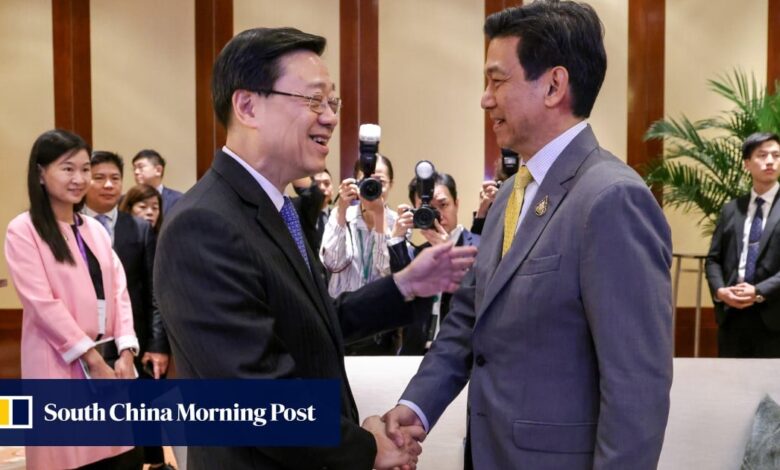Asean rejects being ‘forced to choose sides’ in major power rivalry, says Thailand’s Deputy PM Parnpree Bahiddha-Nukara

[ad_1]
“At a time when we need more global cooperation, the world has become more fragmented with friend-shoring, decoupling and geopolitical rivalry becoming the norm,” Parnpree said during his keynote speech at the Post’s Hong Kong-Asean Summit 2023.
“Major power rivalry must be turned into a rule-based strategic competition that does not force countries in the region to choose sides, nor forgo economic opportunity out of geopolitical consideration.”
Asean does not want to see this region become an arena of confrontation
“Asean does not want to see this region become an arena of confrontation,” he said. “More pertinently, we want to avoid being forced to choose sides.”
Thai prime minister in Hong Kong for investment and promotion drive
Thai prime minister in Hong Kong for investment and promotion drive
Parnpree, who is also Thailand’s minister of foreign affairs, made the comments on Monday at the Hong Kong-Asean Summit 2023 organised by the South China Morning Post in partnership with the Hong Kong-Asean Foundation and the Our Hong Kong Foundation.
Global uncertainties had presented Asean with opportunities, he said, but the region must be prepared to improve its competitiveness and productivity.
“Asean may benefit from this [geopolitical] shift as businesses seek to relocate production bases or new sources of the supply chain,” he said. “But Asean countries must be ready to be an attractive choice for such moves.”
Parnpree highlighted Thailand’s interest in attracting more foreign investment in a sustainable manner as it seeks to focus on green energy and the digital economy.
During his speech, he also discussed Hong Kong’s interest in joining the world’s largest free-trade pact, saying “Thailand supports and welcomes Hong Kong’s formal application to the RCEP”.
Hong Kong’s Lee vows deeper ties with Asean, points to city’s unique gateway role
Hong Kong’s Lee vows deeper ties with Asean, points to city’s unique gateway role
Asean was Hong Kong’s second-largest trading partner last year, with total trade in goods amounting to HK$1.29 billion (US$165 million), accounting for 13.7 per cent of the city’s total, according to Trade and Industry Department figures.
Thailand’s Parnpree said that Asean should look towards Hong Kong as “more than a gateway to China”.
“Rather, Hong Kong is a major investment destination in itself.”
[ad_2]
Source link


